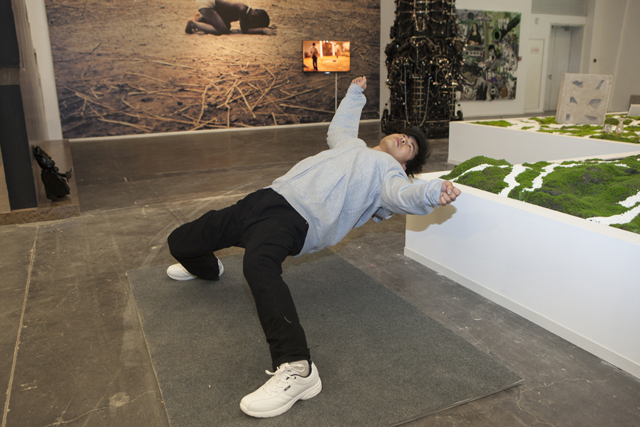The story of a solo artist relinquishing his individual artistic identity to become the CEO of an “art corporation” sounds at first like the very allegory of an artist “selling out”. But that’s only if you still believe in the notion of selling out, especially within an art world that increasingly hangs suspended in the ambivalent space between beauty and commerce, propelled and ruled by the principles of capitalism as acutely as any other industry. Long lost are the romantic visions of artists slaving over canvases in lonely studios; no longer does one exist outside the considerations of the industry.
When Chinese-born Xu Zhen renounced his title as solo artist and launched the wildly successful MadeIn Company in 2009, he posited himself in the role of company CEO, likening his duties to that of an ad agency head responsible primarily for the formulation and sculpting of ideas. In fact, in previous interviews, Zhen stated that “[m]ost of the effort [in MadeIn] is spent on thinking’, downplaying the physical or tactile aspects of creation in favor of a conceptual, idea-based cycle of production.

In preview of New York’s upcoming The Armory Show, in which MadeIn Company is featured as part of Armory Focus: China, I tracked down the reticent artist via email (by way of a translator) and ventured to pick his brain about the evolution of the art world and the role of MadeIn Company in the increasingly, even entirely, commercialised industry.
What follows is a somewhat facetious interview, answers given tongue-in-cheek, that nonetheless responds, however obliquely, to the questions at hand: MadeIn and Xu Zhen arise as the creators of culture, replicating and transforming its products and processes, perpetuating as they are examining them. Xu Zhen’s answers at times read like adages, cleverly evading the demand for clear answers and delineating principles, creating an influx of questions with few ready answers. In this manner, he achieves success, as his interview begins to read exactly like his oeuvre of work: intricate, dynamic, confounding.
aqnb: You relinquished your title as Xu Zhen, the solo artist, and launched MadeIn as an art corporation in 2009, but you’ve spoken before about how creative production was always a collaborative process for you. Did this process change as a result of this transition in any way except scale?
Xu Zhen: Collaborative creation implies cooperation, and in China there is the saying: “Harmony between man and nature.” All the individual elements are open, fusing together, continuously changing shape. As an individual element creates, it emphasizes the individual. However, MadeIn Company or brands create culture by using various creating elements.
aqnb: Could you talk a bit about the climate – economic, political or social – that propelled you to develop MadeIn Company. Was it created in response to a particular direction or void in the art world?
XZ: Art may be an individual thing, but making art is definitely a group thing.

aqnb: You’ve mentioned in previous interviews that one of the freeing things about MadeIn Company is the elimination of authorship in exchange for a collaborative, subject-absent process. What changes can the elimination of authorship or artistic identity bring about in the art world market? What repercussions are there in characterizing art of the work of an artist in similar terms as that of an ad agency?
XZ: In this Internet period, creating methods will definitely involve more and more elements and relations within the market, and academic standards will all be changed. The public will think more and more of their needs, and not of the origins of art. Therefore, we can try new things unscrupulously.
aqnb: Your work seems to collapse the very notion of identity and identifiers, individual artistic identity into a creative corporation, abandoning materialism for a meta-material view of art as creativity and thinking. Could you tell me a bit about your notion that “identity can be faked”?
XZ: True love won’t differ if the person you like is single or married. Art is the same: the ultimate identity is unreliable, and it isn’t important.
aqnb: After launching MadeIn in 2009, you are bringing the newly established “Xu Zhen” brand to this month’s The Armory Show for its debut. How does “Xu Zhen” differ from the rest of MadeIn and what was the thought process behind launching this self-titled brand within the company?
XZ: A married man, if he wants to have a nice life, should be crazy.

aqnb: Much of your work, from ‘Art For Sale’ to ‘The Starving of Sudan’, captures the consumptive process itself as opposed to using its signifiers. Is this something you intentionally set out to do or was it a theme that organically emerged?
XZ: These works are mainly transmitting “art”, and are not merely being an “artwork”.
aqnb: You’ve lamented before the lack of structure or foundation in Chinese contemporary art, stating that support and critical discussion is crucial to the maturation of the arts. Do you see this developing in China any time soon?
XZ: As time goes by, the defaults and benefits due to the lack of such structures will progressively be seen in China.
aqnb: How do you think that the ubiquitous transition into post-internet art is going to affect the Chinese contemporary art scene? Do you see any changes occurring in the international art scene as China becomes a growing consumer market?
XZ: Internet can make the whole world standing at the same starting line. Reaction in the art field is very slow, but it is changing, and it cannot be stopped. **













